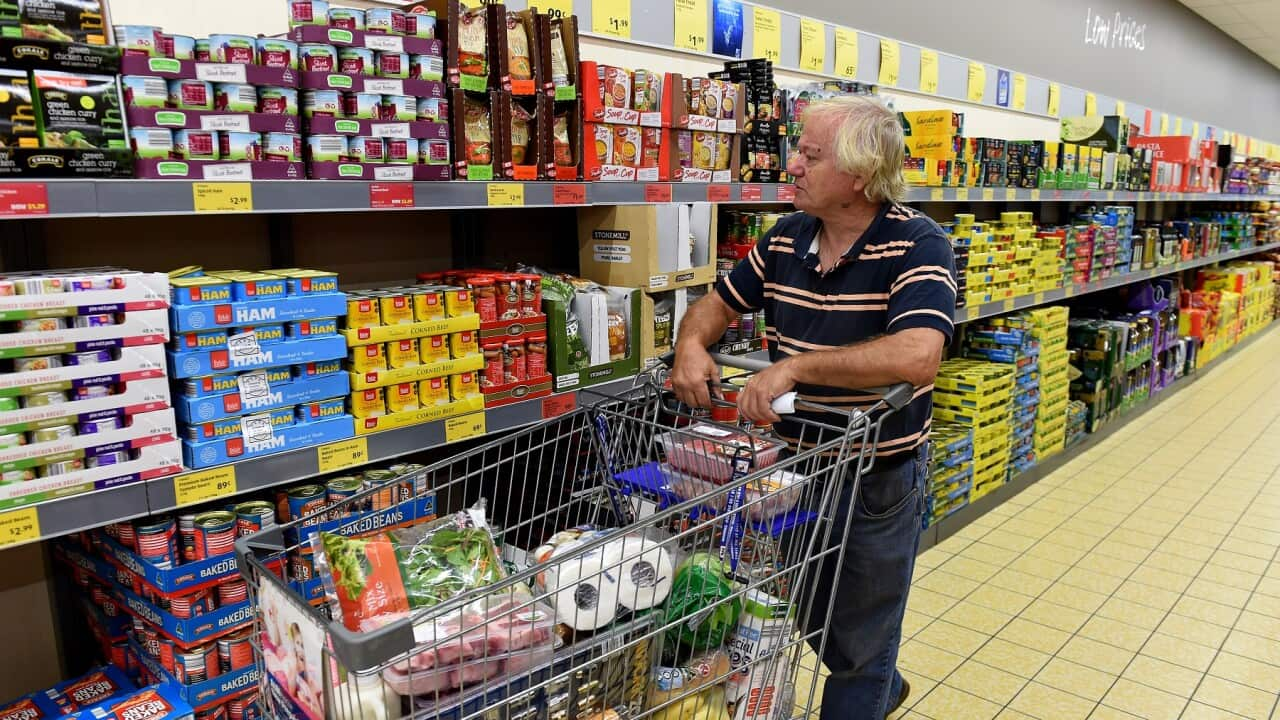TRANSCRIPT
It's little surprise to shoppers that Aldi has once again been named the cheapest supermarket for Australians.
The grocer has been the most affordable in Australia since consumer group Choice began its surveys in 2015.
Choice's second quarterly mystery shopping report revealed a typical basket of goods from Aldi was $50.59, while the same products were just over $66 at Coles, and just over $68 at Woolworths.
Both Aldi and Coles prices went down very slightly compared to Choice's first quarterly report in March, while Woolworth's basket total increased in price.
The consumer group's top suggestion is to shop around - but is this always possible?
Anglicare chief executive's Simon Miller says it often depends where you live in Australia.
“So I mean, if you live in the inner parts of Sydney, you might have the opportunity to go to a Coles or Woolworths and an Aldi and an IGA, and a Harris farm, and you name it. If you live in some parts of the city, you might have one general store. If you live in a country town, you may not have that. You may find that actually access to food is very difficult.”
While the report found little difference in prices across regional areas and capital cities, Mr Miller says it's clear that there's a real difficulty to access food in regional parts of New South Wales.
He says the demand for Anglicare's food pantry - which is stocked with fresh food and pantry staples - is even greater in many regional parts of the state.
“What we've found in some places, we operate across parts of New South Wales in some places in country New South Wales. Rather than having a mobile service, we've now set up fixed services because there is a need for more regular access to this type of food support.”
Choice's Chief Executive Ashley De Silva said Aldi is around 30% better value for products than Coles and Woolworths.
The group compared 14 commonly bought grocery items at 104 supermarkets across the country - including fruit, vegetables, bread, milk and some packaged products.
This pricing report comes as the consumer price index rose again by 1% this quarter, with food and non-alcoholic beverages witnessing one of the most significant price increases.
He emphasises how valuable it can be for consumers to keep an eye on specials - outlining the difference in basket prices for the big supermarkets when including specials.
“We saw that Woolworths, well, the cost at Woolworths increased by $3 and 44 cents, but it actually came down at Coles by $2.30 and by 72 cents at Aldi. Which is interesting because, you know, you kind of see the benefit here of being really able to keep an eye on specials and being willing to kind of, if it's practical, be able to shop between supermarkets and stores.”
Mr De Silva acknowledges not everyone can shop around - but says there are other strategies consumers should adopt.
“So beyond that, some of the best tips around how to get the best price and value at a supermarket include really just turning off autopilot and not shopping out of habit. So slowing down and thinking about what it is that you're buying and considering alternatives. So for example, different cuts of meat, are priced very differently. You can swap out fresh fruit or veg for things that are either frozen or even tinned and don't look past the house brands at supermarkets because Choice does a lot of testing on a whole range of things, including the kinds of products that you're buying at supermarkets. And we often find that house brands outperform the really well known national brands.”
But can consumers always trust the specials?
The ACCC has brought the big supermarkets to court over allegations of misleading discounts.
They allege Woolworths and Coles placed products at regular long-term prices for an extended period of time, and then increased prices by at least 15 per cent for brief periods, before then placing these products in the stores' promotions at prices lower than during the price spike, but higher than or the same as, the regular price before the price spike.
Prime Minister Anthony Albanese issued strong words against such practices.
“These are serious allegations that the ACCC is bringing before the courts. If this is found to be true, it's completely unacceptable. This is not the Australian spirit. Customers don't deserve to be treated as fools by the supermarkets.”
Consumer behaviour expert Graeme Hughes says there are ways consumers can more carefully ensure they're actually securing the best deal.
“I think that if consumers can just slow down and really get out of the marketing space for a moment around the razzle dazzle of the big special and the bright price tickets, they'd be making more informed and smarter choices. Unit pricing is a wonderful way for consumers to actually look at how much the real value in the product and how much that cost, and they can compare that quite easily. So I'd really encourage consumers to look at that.”
He adds there's no denying that the public's trust in Coles and Woolworths has deteriorated in recent times.
“So the large chains have approximately two thirds market share. So consumers have really nowhere to go. And we know in terms of brand trust, Coles and Woollies have been doing it tough. They've gone from held up as pillars of trust or number one and two in terms of brand trust in Australia dropping to fourth and fifth in the most distrusted brands in just over 12 months. So consumers are certainly questioning the behaviour across the board.”
The government funds the Choice reports, with the consumer group telling SBS they provide $1.1 million to conduct their quarterly surveys.
Andrew Leigh is the Assistant Minister for Competition, Charities, Treasury and Employment and says the reports are vital to inform Australians of supermarket pricing - but moderating pricing does not fall under the government's control.
“It's up to those supermarkets to explain their prices. It's not up to me to sit there justifying how they've priced their baskets. My role as the Assistant Minister for Competition is to get those settings right so that in this market, in many others, we're seeing more dynamism, more competition, more greater number of startups.”
But with more people accessing charity food services than ever before, often none of the supermarkets offer affordable enough items for those struggling the most.
“There have always been people who have struggled to afford groceries, particularly people on income support. But what's been particularly worrying for us is that we're actually starting to see new types of people accessing our services, particularly people on minimum income jobs or people who are working in the gig economy.”













